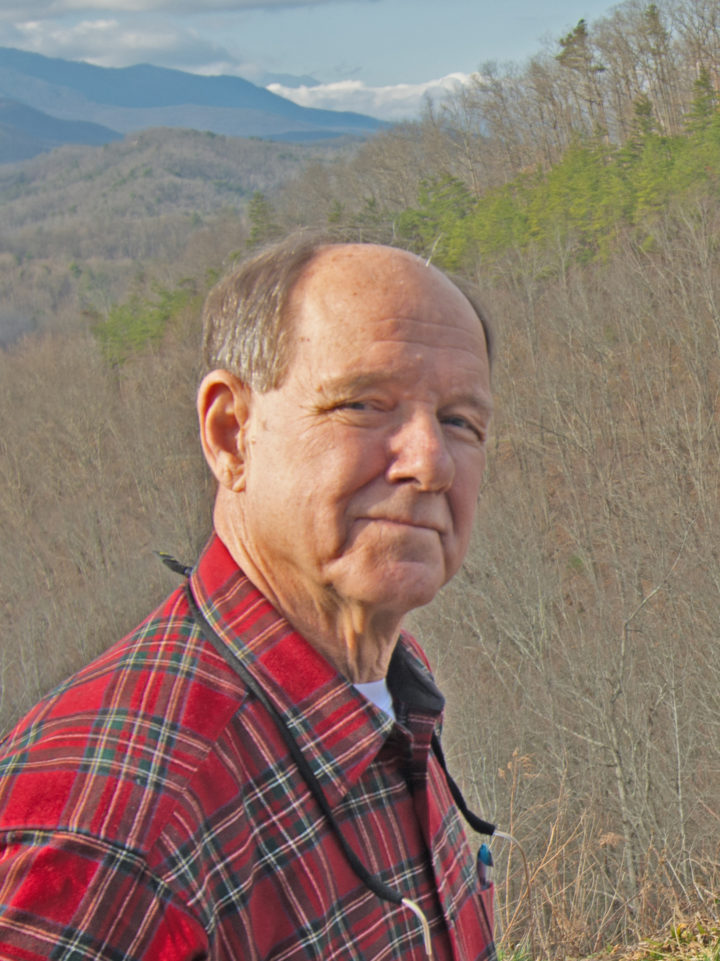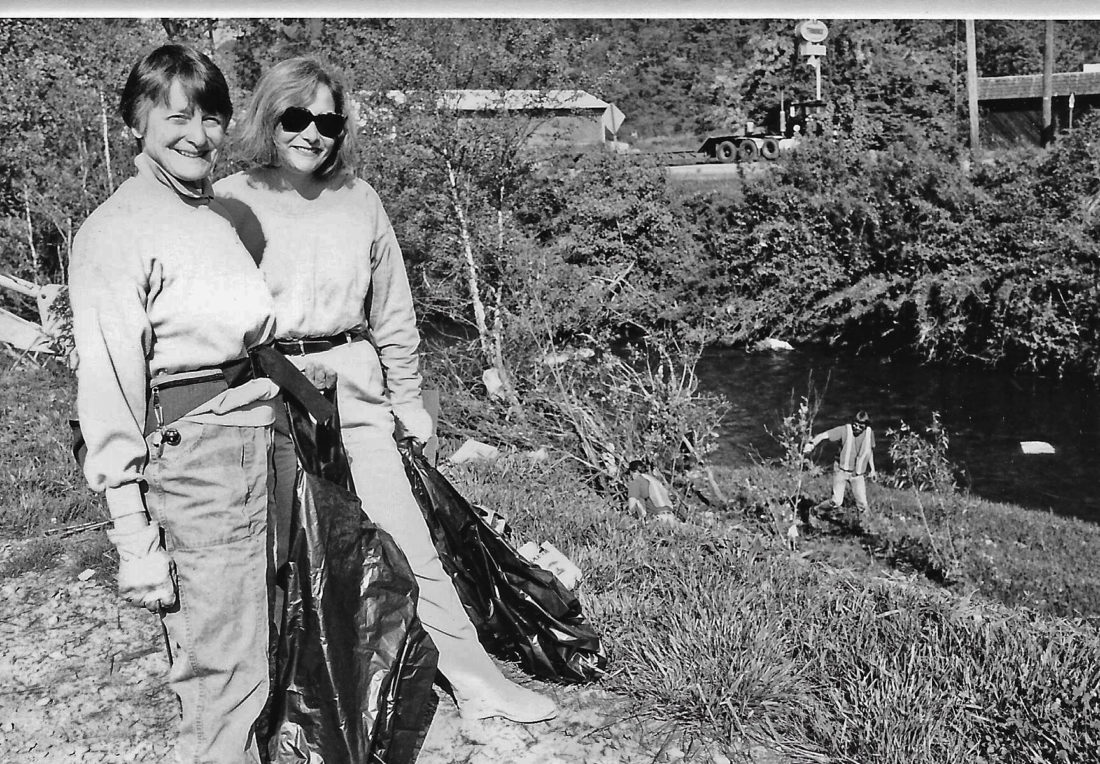BY JOHN ROSS
Wilma Dykeman’s The French Broad, first published in 1955 as part of the Rivers of America Series, was to conservation in Western North Carolina what Rachael Carson’s 1962 book Silent Spring was to the national environmental movement.
Wilma fought with her editors and persuaded them to include the chapter asking, “Who Killed the French Broad?” That chapter and subsequent books, articles and talks she gave galvanized conservationists in the watershed.
Among the most prominent were Karen Cragnolin and Jean Webb. Both have passed in the last few months, Karen on Jan. 22 and Jean on March 29. But whether you are hiking a greenway along the French Broad, jouncing through a rapid or exploring a River Arts District gallery, you feel their achievements. And happily, the next generation of dedicated women leaders is carrying on their legacy.
Early history

In 1973, Webb pioneered Quality ’76 as part of local efforts to commemorate the nation’s bicentennial. It was among the area’s first environmental organizations. “Jean was passionate about nature and committed to community service,” remembers Jim Stokely, Dykeman’s son.
Under her leadership, the group — renamed Quality Forward in 1976 — worked to connect people with their watershed. A tireless champion of safe public access to the river, Webb led litter cleanups, tree and flower plantings and trash-retrieval efforts. She fostered local participation in Stream Watch, a state government program designed to encourage citizen involvement in protecting water quality.
In 1983, while still leading Quality Forward, Webb became the first president of the French Broad River Foundation, newly formed by the Land-of-Sky Regional Council. In partnership with Land of Sky, the foundation started RiverFest, a community celebration designed to bring people down to the river.
Over the next dozen years, the nonprofit staged the annual festival, raised funds for river-related conservation projects and fostered collaboration with local governments. It also developed two river parks and teamed up with UNC Asheville’s Environmental Quality Institute to establish the Volunteer Water Information Network. VWIN continues today, using citizen scientists to monitor water quality. In the 1990s, the foundation was folded into RiverLink, and in 2007, Quality Forward became Asheville GreenWorks.
“Without Jean Webb, the River Arts District, the greenways and the parks might never have happened,” notes Stokely.
A zone of opportunity
What evolved into RiverLink started out in 1987 as a Chamber of Commerce committee aimed at developing an attraction that would encourage tourists to stay an extra day after visiting Biltmore Estate. The group hired Cragnolin, an attorney, a former editor with Prentice Hall and a liaison who fostered public/private collaborations in the Middle East. A ceaseless dynamo, Karen understood how to get things done.
In the first half of the 20th century, Asheville’s riverfront had thrived, with manufacturing facilities producing textiles, leather and wood products. Plant closings in the 1960s and ’70s left the riverbanks lined with abandoned buildings and junkyards. Many considered the urban riverfront an industrial wasteland — but not Webb and Cragnolin.
Karen saw the area for what it truly was: a zone of opportunity. A Boston native and former Washington, D.C., resident, she had to have been familiar with The Rouse Co.’s riverfront festival marketplace developments throughout the Northeast.
And the 1980s was precisely when WNC residents began to realize that the city’s history had economic value. A 1981 referendum killed a plan to raze 11 city blocks for an urban mall — the beginning of downtown’s rebirth.
A few years later, Cragnolin and her family moved to Asheville, where she began focusing her superb legal and communication skills on riverfront revitalization. Among other things, Karen tirelessly led the campaign to create The Riverfront Plan. The 66-page document spelled out how urban land along the river could be rescued and its economic and environmental vitality restored. The document has since been updated and renamed The Wilma Dykeman RiverWay Master Plan.
Across the region
Webb and Cragnolin were Dykeman’s disciples, and so is Hendersonville resident Mary Jo Padgett. In 1987, she co-founded the Environmental and Conservation Organization, which grew to include members in Buncombe, Henderson and Transylvania counties as well as upstate South Carolina. ECO volunteers brought VWIN to Henderson County, and as ECO’s executive director, Padgett collaborated closely with Cragnolin.
“Having Karen and Jean ‘in the neighborhood’ encouraged me to seek appointment on the Henderson County Planning Board in order to raise consciousness on land use issues,” Padgett explains.
She also helped form the Mills River Partnership, which enlists farmers, conservationists and local officials to protect the watershed, a source of drinking water for Hendersonville, Henderson County and South Asheville/Buncombe.
After taking time off to pursue other interests, Padgett returned to ECO as interim director in 2015. That year, the organization merged with the Western North Carolina Alliance and the Jackson-Macon Conservation Alliance to form MountainTrue. Today, French Broad Riverkeeper Hartwell Carson and others at MountainTrue are carrying on that work.
“Wilma Dykeman’s shadow covered all of us,” says Padgett, “and inspired us to speak out and support citizens who were becoming more and more concerned about water quality, air quality, land use, land conservation, forest management, etc., in our mountain area.”
Passing the baton
Today, a second generation of Wilma’s disciples leads major environmental organizations in the French Broad watershed.
Julie Mayfield, MountainTrue’s co-director, was a voice for sustainability during her five years on Asheville City Council. She’s now seeking a second term in the state Senate, running on a platform of balanced economic growth, education, equity and environmental responsibility.
In August, RiverLink hired Lisa Raleigh as its third executive director. An environmental strategist with a doctorate in environmental science, Raleigh spent more than a decade as director of development at Colorado Rocky Mountain School.
Anne Keller, RiverLink’s board chair, says Raleigh “is passionate, experienced, knowledgeable about rivers and watersheds, a successful fundraiser and generally a wonderful addition to the Asheville community.”
Raleigh is leading a $1 million capital campaign to fund the transformation of a former auto junkyard into Karen Cragnolin Park. The property is seen as a key link in the 17-mile Wilma Dykeman RiverWay.
Based on my work as a RiverLink board member and my research into the watershed’s environmental and economic evolution, I’m convinced that generation after generation will follow in the footsteps of Webb, Cragnolin, Padgett, Mayfield, Raleigh and a host of others I don’t even know as Wilma’s disciples.
Asheville resident John Ross serves on RiverLink’s board of directors. His newest book, Through the Mountains: The French Broad River and Time, was a finalist for the 2021 Reed Environmental Writing Award, sponsored by the Southern Environmental Law Center.



Before you comment
The comments section is here to provide a platform for civil dialogue on the issues we face together as a local community. Xpress is committed to offering this platform for all voices, but when the tone of the discussion gets nasty or strays off topic, we believe many people choose not to participate. Xpress editors are determined to moderate comments to ensure a constructive interchange is maintained. All comments judged not to be in keeping with the spirit of civil discourse will be removed and repeat violators will be banned. See here for our terms of service. Thank you for being part of this effort to promote respectful discussion.